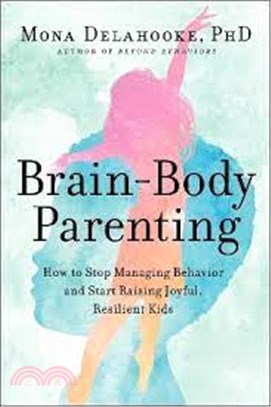目前查詢
歷史查詢

Brain-body parenting :how to stop managing behavior and start raising joyful, resilient kids /
作者 : Delahooke, Mona.
出版社 : Harper Wave, an imprint of HarperCollins Publishers,
出版年 : 2022
ISBN:9780063061316
- 館藏(1)
- 書目資訊
- 心得(0)
- 機讀格式
- 標籤
書名 : Brain-body parenting :how to stop managing behavior and start raising joyful, resilient kids /
紀錄類型 : 書目-語言資料,印刷品: 單行本
正題名[資料類型標示]/作者 : Brain-body parenting :Mona Delahooke, PhD.
其他題名 : how to stop managing behavior and start raising joyful, resilient kids /
其他題名 : How to stop managing behavior and start raising joyful, resilient kids
作者 : Delahooke, Mona.
版本項 : 1st ed.
出版者 : New York :Harper Wave, an imprint of HarperCollins Publishers,c2022.
面頁冊數 : viii, 343 p. ;24 cm.
內容註 : Introduction: personalizing your parenting -- Part I: Understanding brain-body parenting. How to understand your child's physiology -- and why it's important -- Neuroception and the quest to feel safe and loved -- The three pathways and the check-in: how understanding the brain and body can help us respond to our children -- Part II: Solutions. Nurturing children's ability to self-regulate -- Taking care of yourself -- Making sense of the senses: how emotions arise from the body's experience of the world -- The first year -- Tantrums throw toddlers: putting toddlerhood in context -- Elementary school-age kids: flexibility and creating a big tool chest -- Flourishing.
標題 : Child psychology.
ISBN : 9780063061316
LEADER 03470cam a2200253 a 450
001 1164725
008 230926s2022 nyu e b 001 0 eng d
010 $a 2022279448
020 $a9780063061316$q(hbk.) :$cUSD32.00
035 $aNO000234593
037 $b公共圖書館臺南分區資源中心
040 $aGIP$beng$cGIP$dYDX$dTWTNM
050 00$aHQ772$b.D43 2022
082 0 $a155.4$223
090 $a臺南市立圖書館
100 1 $aDelahooke, Mona.
245 10$aBrain-body parenting :$bhow to stop managing behavior and start raising joyful, resilient kids /$cMona Delahooke, PhD.
246 30$aHow to stop managing behavior and start raising joyful, resilient kids
250 $a1st ed.
260 $aNew York :$bHarper Wave, an imprint of HarperCollins Publishers,$cc2022.
300 $aviii, 343 p. ;$c24 cm.
504 $aIncludes bibliographical references (p. [321]-335) and index.
505 0 $aIntroduction: personalizing your parenting -- Part I: Understanding brain-body parenting. How to understand your child's physiology -- and why it's important -- Neuroception and the quest to feel safe and loved -- The three pathways and the check-in: how understanding the brain and body can help us respond to our children -- Part II: Solutions. Nurturing children's ability to self-regulate -- Taking care of yourself -- Making sense of the senses: how emotions arise from the body's experience of the world -- The first year -- Tantrums throw toddlers: putting toddlerhood in context -- Elementary school-age kids: flexibility and creating a big tool chest -- Flourishing.
520 $aFrom a leading child psychologist comes this groundbreaking new understanding of children's behavior, offering insight and strategies to support both parents and children. Over her decades as a clinical psychologist, Dr. Mona Delahooke has routinely counseled distraught parents who struggle to manage their children's challenging, sometimes oppositional behaviors. These families are understandably focused on correcting or improving a child's lack of compliance, emotional outbursts, tantrums, and other "out of control" behavior. But, as she has shared with these families, a perspective shift is needed. Behavior, no matter how challenging, is not the problem but a symptom; a clue about what is happening in a child's unique physiologic makeup. In Brain-Body Parenting, Dr. Delahooke offers a radical new approach to parenting based on her clinical experience as well as the most recent research in neuroscience and child psychology. Instead of a "top-down" approach to behavior that focuses on the thinking brain, she calls for a "bottom-up" approach that considers the essential role of the entire nervous system, which produces children's feelings and behaviors. When we begin to understand the biology beneath the behavior, suggests Dr. Delahooke, we give our children the resources they need to grow and thrive--and we give ourselves the gift of a happier, more connected relationship with them. Brain-Body Parenting empowers parents with tools to help their children develop self-regulation skills while also encouraging parental self-care, which is crucial for parents to have the capacity to provide the essential "co-regulation" children need. When parents shift from trying to secure compliance to supporting connection and balance in the body and mind, they unlock a deeper understanding of their child, encouraging calmer behavior, more harmonious family dynamics, and increased resilience.
650 0$aChild psychology.
650 0$aChild rearing.
650 0$aParent and child.
650 0$aBehavior modification.$2csht$3582625
650 0$aChildren$xConduct of life.
650 0$aParenting.
650 0$aChild development.
653 $a多元學習
653 $a知識性
